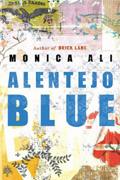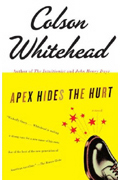
The Morning News Tournament of Books, sponsored by Powell’s Books, is an annual battle royale amongst the top novels in “literary fiction” published throughout the year. Read more about this year’s tournament »
» Buy the Books at Powells.com «
» Meet This Year’s Judges «
» Check the Bloggers’ Office Pool «
» Relive the Action: 2006, 2005 «
» Contact the Tournament Staff «
• ROUND ONE • MATCH SEVEN •
March 16, 2007
 |
Alentejo Blueby MONICA ALI |

|
| v. | ||
Apex Hides the Hurtby COLSON WHITEHEAD |
judged by DAN CHAON
Of the two books, Apex Hides the Hurt is clearly the hipster’s choice. It’s full of wonderfully clever observations about race, class, and popular culture, and I can imagine that it would be a fun book to teach in a literary theory class. The writing is always polished and gleaming, full of bon mots and scintillating sentences. It’s all very witty and smart.
Alentejo Blue, on the other hand, does not seem particularly cool. It’s a collection of loosely interconnected stories for one thing, and if that’s not dorky enough, it’s all about a crummy, run-down village in Portugal. The characters are leading lives of quiet desperation and the writing is full of a kind of gentle rue that has more in common with modernist writers like Katherine Mansfield than with contemporary novelists. Especially when Ali is writing from the point of view of her Portuguese characters, her prose sometimes takes on the maladroit earnestness of Steinbeck in The Pearl or something. Her attempt to bring all the characters together in the final chapter is clunky and unsatisfying.
But nevertheless I was genuinely moved and engaged by Alentejo Blue in a way that I wasn’t by Apex Hides the Hurt.
Frankly, I wasn’t expecting this. When the books came in the mail, I thought that the contest was unfairly mismatched. Apex Hides the Hurt is called “brilliant” in no less than four blurbs. Alentejo Blue, on the other hand, got some pretty savage reviews in the American press, even from traditionally kind-hearted reviewers like The Washington Post’s Ron Charles, who described the book as “excruciatingly dreary.” Actually, I’m ashamed to say that having seen a couple of reviews of this sort, I wasn’t even planning to read the book.
So in some ways I guess Alentejo Blue benefits from my lowered expectations. But I have to say that I was really taken with her characters, and even got a little verklemt on a couple of occasions. My favorite characters were the Potts clan, a trashy expatriate British family (drunk, pot-smoking dad; washed-out ex-junkie mum; deaf, slutty daughter; sad, aimless little boy) who are portrayed with great perception, richness, and nuance. I was impressed by Monica Ali’s ability to convincingly inhabit so many different people, and I appreciated the sympathy and generosity she extended to them. She seems genuinely interested in and curious about people.
Whereas Colson Whitehead doesn’t, really. Apex Hides the Hurt is a book that feels like it has everybody figured out to its own satisfaction, in ways that can sometimes seem a little pat. The critique of American commercialism at the heart of the novel is apt and intelligent, but it also strikes me as fairly familiar. When an irritated hotel maid leaves the unnamed consultant-protagonist an angry note: “You THINK you are so smart, smarty-pants. But you ARE NOT,” I kind of agreed with her. A little bit of the narrator’s quipping and deft observation and astute cultural analysis goes a long way. But you know, I find that I much prefer the company of losers, alcoholics, depressed housewives, obsessive fatties, self-deluded teenage girls, etc. Anyone but a consultant. This is obviously a matter of personal taste.
• About the Judge •
• From the Booth •
| Personally, I’m not sure a C-17 full of ActiveOn could hide the hurt of being spat upon by a National Book Award winner. | Kevin | John | When I read Colson Whitehead’s first novel, I thought I’d encountered the next great American novelist. |
» Read Kevin Guilfoile & John Warner’s commentary on the match «

» DOWNLOAD THE BRACKETS «
• Round One •
Half of a Yellow Sun v. Absurdistan
judged by Brady Udall
The Echo Maker v. The Emperor’s Children
judged by Marcus Sakey
Firmin v. Brookland
judged by Sarah Hepola
The Second Coming of Mavala Shikongo v. The Road
judged by Maria Schneider
Arthur and George v. One Good Turn
judged by Kate Schlegel
The Lay of the Land v. English, August
judged by Colin Meloy
Alentejo Blue v. Apex Hides the Hurt
judged by Dan Chaon
Against the Day v. Pride of Baghdad
judged by Anthony Doerr
• Round Two •
Half of a Yellow Sun v. The Emperor’s Children
judged by Jessa Crispin
Firmin v. The Road
judged by Mark Sarvas
One Good Turn v. The Lay of the Land
judged by Maud Newton
Alentejo Blue v. Against the Day
judged by Sam Lipsyte
• SEMIFINALS •
Half of a Yellow Sun v. The Road
judged by Elizabeth Gaffney
One Good Turn v. Against the Day
judged by Sasha Frere-Jones
• ZOMBIE ROUND •
The Road v. Against the Day
judged by Andrew Womack
One Good Turn v. Absurdistan
judged by Rosecrans Baldwin

